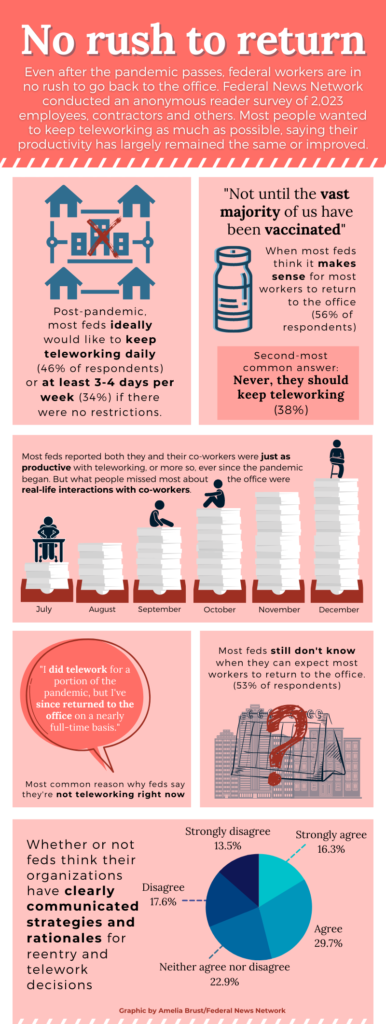Data Dive
New normal or ‘same old bureaucracy?’ Feds offer mixed views on telework prospects beyond pandemic
A majority of the federal employees and contractors who responded to a recent Federal News Network reader survey said they'd prefer to telework at least three days...
For many federal employees, the start of the new year marked 10 consecutive months of telework since the COVID-19 pandemic began in earnest last March.
But with the initial stages of COVID-19 vaccine distribution underway and the start of a new administration in two weeks, federal employees are wondering whether their experiences over the last 10 months will bring about long-term, lasting changes to the way they work.
In an anonymous, online survey of Federal News Network readers, federal employees and contractors were mixed on whether telework was truly a “new normal” — and whether current and future agency leaders and supervisors would take the lessons they’ve learned over the last 10 months and translate them into concrete, tangible changes to government telework policy.
But if they had no restrictions, a majority of employees and contractors teleworking daily today said they’d choose to continue remote work on a regular or even permanent basis once the pandemic ends.
According to a Federal News Network survey of roughly 2,000 federal employees and contractors, 48% of teleworking respondents said they’d choose to work remotely every day if they could.
“Traffic is better, and if we could convert all those offices to lab space, that would suit me just fine!” one federal employee said.
Another 35% said they’d opt to telework three-to-four days a week, while 13% said they’d prefer to remote from home one or two days a week.
Just 3% said they’d choose to telework a few days a month. And less than 2% said they don’t want to telework again once the pandemic ends.
“If I wanted to be home 24/7, I’d retire,” one respondent said.
Federal News Network surveyed its readers about their telework views and expectations between Dec. 8-21. Because respondents chose to participate in the survey, the results are not meant to be a comprehensive representation of the entire federal workforce and their views.
By and large, most survey respondents had a positive view of their telework experiences over the last 10 months. A majority of both teleworkers and non-teleworkers said their productivity has either increased or stayed the same since the pandemic began last March. 
Most are in no major rush to return to the office. About 56% of all respondents said the majority of the workforce shouldn’t return to the physical office space until most employees had received a COVID-19 vaccine.
For those who are still teleworking, 53% said they weren’t sure when their agencies would ask the vast majority of the workforce to return to the office.
“[A] final decision has not been made,” one respondent said. “[There’s] lots of moving pieces in a very challenging environment. While the workforce wants to know what the long-term plans are, there are too many unknowns at this time to make a long-term plan, especially as things change daily.”
Other federal employees, roughly 28%, said their agencies have suggested they might return to the office later this spring or summer.
“It could be spring/summer,” one person said. “It’s only been a couple of weeks since they stopped issuing weekly ‘we’re staying in Phase 2 another week’ notices. I’m cautiously optimistic that the new administration will take things more seriously.”
Other employees suggested it could be longer before the vast majority of their agency’s workforce returns to the office.
“My agency isn’t returning to the building until late 2022, but that’s because it will be redesigned to accommodate fewer employees in the building,” one person said.
Another employee said his agency was initially eyeing a June return-date, but the plan may change.
“Recent discussions have centered on looking at telework as a cost-saving measure and determining who would be suitable for full-time telework,” the respondent said.
Roughly 53% of teleworkers believe their agencies’ support for remote work will increase after the pandemic, and some employees said their organizations were already adopting more flexible workforce policies.
“Our organization used to be against telework, but productivity increased so much they could not ignore that and are now embracing it,” one respondent said. “Established teams are being given the option to continue teleworking with in-person meetings at least once per week so any new team members can put a face to a name and integrate easier. The face-to-face meetings will only happen once the pandemic ends.”
“I understand they are updating our telework policy now,” another employee said. “If what we are being told is correct, our agency is pleased with the output of work.”
Federal employees mixed on long-term outlook for telework
But 31% of survey respondents said their agencies’ support for remote work would decline or stay the same. Another 16% said they weren’t sure how their agencies might embrace or support telework in a post-pandemic world.
“It will increase over what it was before the pandemic but am not optimistic that it will be as flexible as it is right now,” one person said.
Others were more pessimistic. One respondent believed his or her cabinet agency would return to the “same old bureaucracy” once the pandemic ended.
“Unfortunately I think telework stigmas will quickly return to pre-COVID ways,” another person said. “Leadership thinking changes slowly. Managing employees by walking around (versus by work output) is still very popular and will return, unfortunately.”
Still others said the long-term outlook for remote work would ultimately depend on their agency’s leadership. Some respondents said they were hopeful new leadership with the incoming administration would see the value in preserving the telework experiences from the last 10 months.
“Our current department secretary discouraged and limited telework,” one employee said. “Our next secretary (announced, not confirmed of course) was the previous secretary, a huge supporter of telework. I think the necessary flexibility we’ve adopted is going to become the new normal.”
Regardless of their agencies’ support for remote work after the pandemic, many employees believed the tools and physical equipment they’re currently using to collaborate with their coworkers, such as Zoom and Microsoft Teams, as well as their laptops and mobile devices, would outlive the health crisis.
“We are all much more tech savvy,” one person said. “MS Teams is here to stay. I’m cautiously optimistic that the idea we have to physically be present to be effective will go away, although I’ve been around long enough to remember when they talked about ‘hoteling.'”
Others believed their agencies would continue to eliminate the need for paper-based deliverables, instead relying on cloud-based platforms to accomplish their work. Many employees and contractors said IT capacity at their organizations had improved during the pandemic and would persist beyond the health crisis.
Others hoped electronic signature and file sharing capabilities, as well as virtual onboarding, training and conferences would outlast the pandemic.
“The ways in which we leverage technology to connect with internal and external stakeholders [may change],” one respondent said. “We have become more efficient with less in-person interaction. Limited travel budgets can also be maximized through advancements in communications technology. Overall, we have learned to become more efficient with less. It’s really the elephant in the room.”
Others see room for their organizations to expand their talent pools.
“The agency has realized that [we] are not limited to one geographical area for hiring good talent,” one employee said. “As a result, more talented skilled employees are being hired instead of hiring some employees (local) and spending money to get them up to speed.”
Though most survey respondents believed their agencies would see a lasting impact through the IT, collaboration tools and remote work flexibilities, other federal employees hoped the pandemic had brought on a culture change within their organizations.
“Hopefully if telework isn’t a part of regular schedules — I used to work from home one day per week — it can be a part of a more inclusive work environment,” one person said. “For parental leave, caring for sick relatives, parents, and people struggling with physical or mental illness, or just once a year going to spend time with family in a different state, telework could be used for a month or so to allow people to work and balance their lives.”
Other respondents said the pandemic has shown some agency leaders they can trust their employees to complete their work even if they can’t physically see them at the office.
“They were surprised that we don’t have to be in the same place to work and work well,” one employee said. “I hope that in turn, we reduce real estate footprints, encourage remote workers and have a larger pool to draw exceptional employees from.”
Copyright © 2025 Federal News Network. All rights reserved. This website is not intended for users located within the European Economic Area.
Nicole Ogrysko is a reporter for Federal News Network focusing on the federal workforce and federal pay and benefits.
Follow @nogryskoWFED
Related Stories




